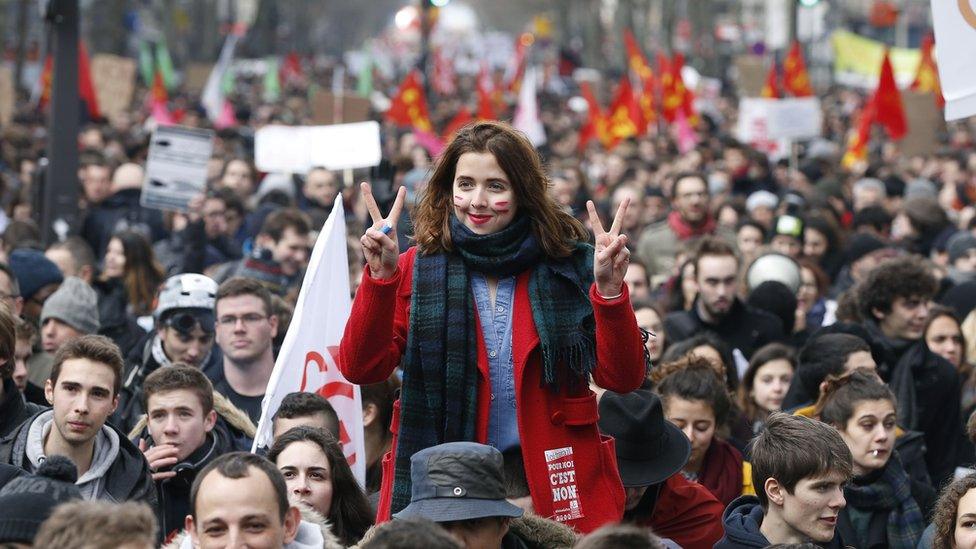France unions and youths protest against labour reforms
- Published

Students joined labour unions in protests against the proposed reforms to the country's labour code - which is famously longer than the Bible
Protests have been held around France as unions and young people joined forces to show their opposition to proposed labour reforms.
Youth organisations and unions were demonstrating on the same day as a rail strike over a wage dispute.
The proposed law would remove some of the protection workers enjoy against being laid off, in a bid to encourage businesses to hire more people.
But many on the left see it as a betrayal of their values.
In pushing the reform, Prime Minister Manuel Valls has united a formidable array of leftist forces against him, says the BBC's Hugh Schofield.
That includes not just the unions but much of his own Socialist party - plus the students, who were leading Wednesday's protests.
Teenagers and students were among thousands marching in Paris chanting slogans such as "El Khomri, you're beat, the youth are in the street", in reference to Labour Minister Myriam el Khomri.
Dozens of schools around the country were barricaded by students.
Maryanne Gicquel, a spokesperson for the FIDL student union, described young people's experience of the job market as "a succession of internships and poorly-paid jobs".
"Now we're being told that it will be easier for companies to lay off workers," she told AP news agency.
This reform has crystallised all those forces on the left who, while feeling increasingly unhappy about the government's drift, until now had no clear-cut issue around which to rally, our correspondent reports.


Widespread support? Hugh Schofield, BBC News, Paris
It was - to be only a little bit unfair - all the usual suspects at the Paris demo. Trotskyite students chanting against the patriarchy; anarchists; grizzled veterans of '68; plenty of pensioners; theatre-workers. In other words the regular left-wing alphabetti-spaghetti.
One is tempted to ask who these people actually represent. The proportion of lycee and university students who turned out for the protest must have been absolutely minuscule. The vast majority didn't care enough and stayed away.
But the thing about French demos is that - more often than not - it is only the regular protesters who turn out. That is par for the course.
What counts is not what the protesters think - that we know - but what the rest of the country thinks about the protesters. If ordinary people disown the movement, then it is doomed.
But ordinary people in France are always reluctant to disown movements which deploy effectively the slogans of workers' rights and social progress. And this movement is definitely one of them.

In Paris, the rail strike caused early disruption, with only one in three trains running and long queues of traffic, said reports.
Sit-ins and street marches were planned across the country - though some reports suggested a lower than expected turnout, with some protesters possibly deterred by heavy rain.
President Francois Hollande's four years in office have been marked by poor economic growth and spiralling unemployment - now reaching 10% and 24% among youth.
The government of Mr Hollande, who faces presidential elections next year, is aiming to address those issues - with reforms to France's labour code, which is famously longer than the bible.
The reforms would:
Lower existing high barriers to laying off staff
Allow some employees to work more - far more - than the current working week, which is capped at 35 hours
Give firms greater powers to cut working hours and reduce pay
The most visible proponents of the bill - Mr Valls and Economy Minister Emmanuel Macron - have urged backing for the proposals, pointing out that they would bring France into line with practice in the rest of Europe.
"The terrible thing would be the status quo," Mr Valls has said.
But labour protections and the 35-hour week are sacred totems on the French left, and polls show strong opposition to the reforms.
An online petition against the law has been signed by more than a million people.
- Published16 September 2015

- Published26 February 2016
